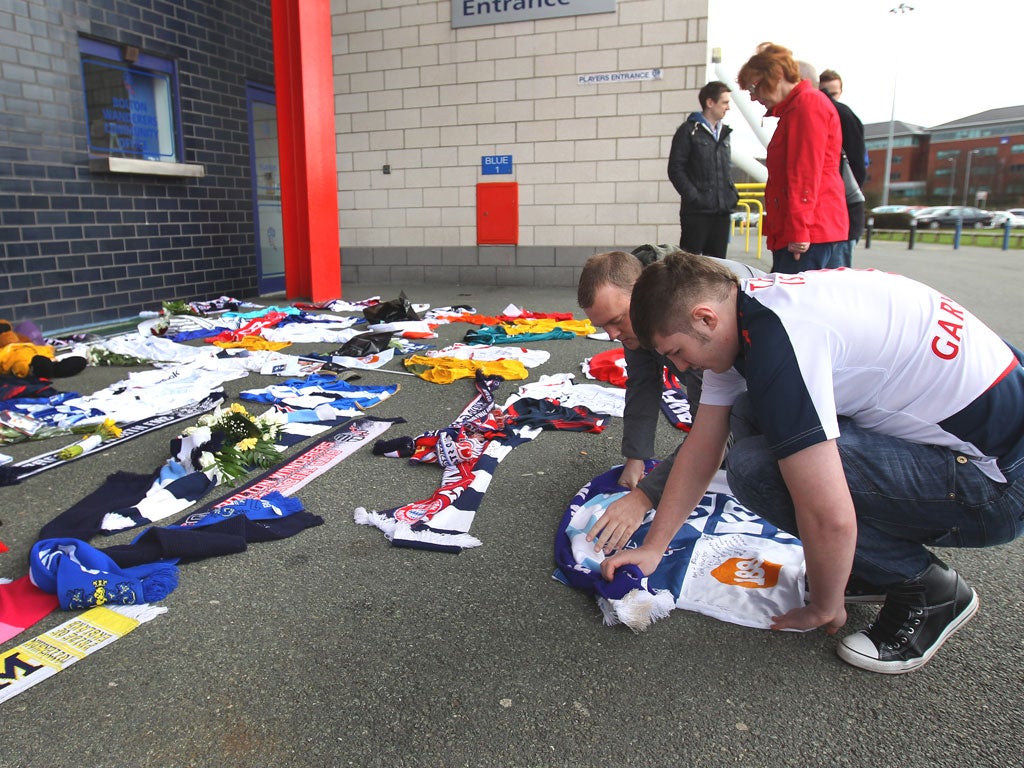James Lawton: As Charlton did after Munich, Bolton must play on – to honour Fabrice

It is entirely understandable that some players of Bolton Wanderers would prefer to revisit most places on earth rather than White Hart Lane as early as next week. Traumatised by the sight of their team-mate Fabrice Muamba caught in such a random, terrifying tragedy, confronting perhaps for the first time the reality that being young and conspicuously fit does not necessarily proof you against the vagaries of fate, it would be remarkable if their appetite for the abandoned FA Cup tie had not been severely disturbed.
However, it would be wrong for Bolton to withdraw from the tournament. The possibility, we are told, will be discussed in meetings between the Bolton directors, manager Owen Coyle and players and in consultation with the Football Association.
One feeling is that it would be asking too much of Muamba's team-mates to go back to the place which so recently filled them with horror – and this is certainly consistent with the widespread emotional reaction that the young player's plight somehow rendered football in general and this particular Cup tie "meaningless".
Yet at what point would the Wanderers be required to fulfil their professional duties?
Unfortunately, there is no rule of thumb on such generally uncharted areas of human frailty, no time limits – or extensions – for those who find it harder than others to deal with some of life's harshest developments.
This, of course, is the dilemma which from time to time intrudes even into what so many who watch it see as the fantasy world of football, something that can be picked up and put down as you might a TV show or the latest hit movie.
Football is though, as the tragic Fabrice reminded us, real life played by real people and the trouble with real life is that sometimes it has to be prosecuted in the worst of times.
Over the last 50 years or so in this country football has provided two classic examples – the Munich tragedy of 1958 and Hillsborough in 1989. On both occasions players who lived through the ordeals questioned deeply their will to go on, at least without some respite.
Sir Bobby Charlton, lightly injured but profoundly shocked, retreated to his native North-east with no sure sense that he would ever again be able to play with his old passion. It took an impromptu kick-around with local lads in the alley at the back of his family's terraced home to recreate some of his old feeling for the game – and the inspiration provided by his team-mates Harry Gregg and Bill Foulkes, who worked heroically to help fellow survivors and then reported back to duty immediately.
We do not quite know the full extent of the scars they carried on their way to that season's FA Cup final, ironically against Bolton.
Many years later, Charlton reflected on those days when he went back to his roots – and the protection of those he knew best. "I did wonder if it could ever be the same," he said, "after losing all those team-mates with whom I had shared everything. And it never could, because there are times in life when you lose your innocence, when you have to look at things from a different angle – and that was what we all faced after Munich. Some dealt with it better than others, but of course everyone was changed."
After Hillsborough, the Liverpool players also fought their way to the Cup final – and won against Everton, five weeks after the loss of 96 spectators. John Aldridge, who had said he'd never been more detached from the game in which he made his living, scored.
Better, infinitely, for Bolton to show the kind of determination and nerve and maturity produced so abundantly by the young man who lies stricken in hospital. If the Bolton players want a cause, there could be no better one than to fight on – in his name and his image.
Neville falls foul of Premier League hype
Gary Neville has received much praise – and not least here – for his impressive progress as a football analyst of serious intent and bold, professional opinion.
It was thus especially disappointing to read his long and flattering missive on behalf of the Premier League and, of course, perhaps incidentally the league's and his own principal paymaster, Sky TV.
Despite the dismissal from the second tier Europa League of his former club Manchester United and their only title rivals Manchester City, Neville (above) asserts that the Premier League remains the best in the world – a fact endorsed, he says, by global TV hits. He tells us that the Premier League is suffering a mere blip.
Presumably he missed the quality of the football which Athletic Bilbao imposed upon United last week – and the fact that the victors have long had only a distant view of the backs of Real Madrid and Barça in the La Liga title race.
The reason for that first impact, Gary, was that we heard an authentic football voice. It made such a change from all the hype.
Mallett still has claims
Some believe that the Rugby Football Union is observing a mere courtesy by interviewing Nick Mallett under the shadow of the achievements of England's interim coach, Stuart Lancaster.
There is, however, an argument for hearing both cases. Lancaster has, no doubt, done a fine job. But does he have the depth of international experience required to turn an encouraging burst of redemption into the kind of enduring improvement for which the resources of English rugby cry out? Mallett would bring the aura of a proven coach – and a degree of independent thinking. Sooner or later, that could well be the key to everything.
Join our commenting forum
Join thought-provoking conversations, follow other Independent readers and see their replies
Comments
Bookmark popover
Removed from bookmarks